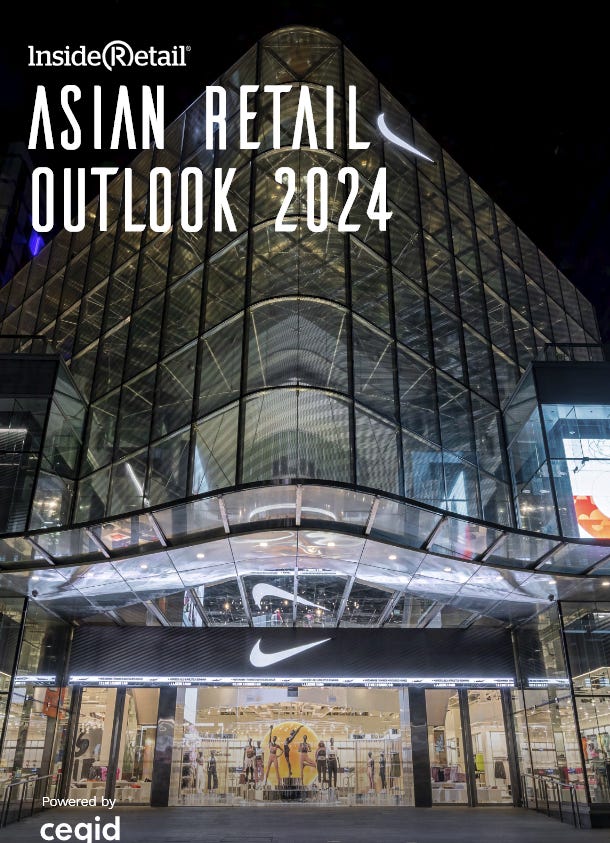Global Digital Marketing & Retail by Alex 27
Inspiration from across the world for retail enthusiasts, e-commerce professionals, marketing lovers and technology fans.
A fresh edition. Superfresh actually, as I moved to my own domain “crossborderalex.com”. I am still using Substack as a hosting/newsletter provider, but as I like blogging/writing, I decided to continue on a custom domain as of now. There is a lot of news this week, so let’s get started.
🇲🇽 (Amazon) Sellers attention: bypass US Custom duties via Mexico or Canada
For a while, I closely followed sourcing and shipping products for e-commerce brands. I still follow this news, although a little less closely, but this one got my attention. If you are in the US and you are a seller who wants to avoid US customs duties, pay attention to this video. Basically, it comes down to ship to Canada or Mexico, not selling it there but exporting it directly to the US.
Mexico is currently the largest exporter to the US, probably partly or largely because of this possibility. A possibility that can be used by many, including the Chinese giants.
Details: https://twitter.com/AaronandML/status/1760470076082315448?t=bvMMzI8V_diwfbrbKhYmBA&s=03
🌏 Top 25 Global Websites: Wikipedia ranked #1
Bytelevel Research is a company active in cross-cultural e-commerce and global marketing. They published their Top 25 global websites in 2024. Worth a mention as I blog on the same topics.
Wikipedia proves yet again that you don't need to a be multinational corporation to successfully communicate with the world. You need only build a world-ready web template and recruit a passionate group of content creators and translators from around the world with a shared mission of creating and unlocking information for all.
Airbnb remains in second place in large part to its investment in customer-facing automatic translation (now better known as generative AI). I suspect we're going to see a few other companies launch content models such as this within the travel sector, possibly this year.
As you scan the list you'll notice that tech companies don't hold a monopoly in web globalization; you'll see companies such as Bosch, IKEA, John Deere and Pfizer. When I began the Report Card 20 years ago, tech companies dominated this list; not any more.
🌏Report time: Asian Retail Outlook 2024
While I always find Asian retail trends fascinating, and consider the region a global leader in retail innovation, Insideretail's 2024 Asian Retail Outlook, while potentially informative, doesn't offer many groundbreaking insights.
The report, only 24 pages, could benefit from incorporating more novel perspectives and real-world case studies to truly inspire and guide retail professionals navigating the dynamic Asian market. Nevertheless, it might be valuable to some, so I share it below.
The integration of AI technology will significantly boost the skills of the in-store team. Powered by AI, sales associates can deliver real-time, personalised recommendations that align with customer desires. Image recognition technologies driven by AI will make product scanning obsolete, enhancing productivity and expediting the checkout experience.
Equipping teams with the latest technological advancements, such as user- friendly mobile apps and sophisticated point-of-sale systems, is crucial – not only to bolster operational efficiency but also to enrich the human connections that underpin exceptional service. The transformation toward more agile information systems is a non- negotiable aspect of future-proofing retail businesses. Success will favor those who embed omnichannel capabilities into their core, with systems agile enough to pivot in response to market shifts.
Details: https://insideretail.asia/client-report/asian-retail-outlook-2024/
Or direct download via my Google Drive: https://drive.google.com/file/d/1S3kgvwE0uuoz5mNw68Cpx0Pcesvv40Bp/view?usp=drive_link
🇪🇺 Almost March 6th, time for the EU’s Digital Marketing Act
Gus Pelogia dug into the EU’s Digital Marketing Act and how it changes SERPs.
The DMA (Digital Marketing Act) is expected to significantly alter the digital market environment within the European Union, providing consumers with increased choice and control.
While the Digital Markets Act (DMA) has both potential benefits and drawbacks, it's coming into effect on March 6th, so businesses need to adapt.
For those involved in international e-commerce and retail within the EU, understanding the DMA's impact on search results is crucial. In essence, ensuring your website's "structured data" is properly set up becomes even more important for increasing visibility under the new regulations.
Marketplaces and blog posts with listicle content could benefit because they are currently classified as an aggregator, and I found relevant results displaying these pages - results I’d actually click and fulfill the intent behind my search. It's more SERP real state for SEOs to explore.
To adapt to this law, Google is changing how the SERPs look in several verticals: Travel, Local, Shopping and Jobs. Below, I discuss which changes already have been implemented and I managed to trigger searching from Ireland. Some of these changes can really affect (positively) SEO opportunities in these areas.
The carousel results depend on web pages having the appropriate structured data markup. Without that markup, pages will continue showing the standard text search results.
While initially launched for travel and local searches, Google is testing the carousel for shopping queries in Germany, France, Czechia, and the UK.
Details: https://www.guspelogia.com/google-dma-serp-changes
Details: https://www.searchenginejournal.com/google-is-rolling-out-new-search-features-in-europe/508439/
🔍Gartner Predicts Search Engine Volume Will Drop 25% by 2026
Gartner's prediction of a 25% drop in search engine volume by 2026 due to AI chatbots and virtual agents resonates with my own experience.
Recently, I used Substack's AI chatbot to navigate a technical issue regarding transferring my blog. The chatbot's ability to answer complex questions efficiently and effortlessly surprised me, eliminating the need for human support or traditional search engines.
This personal experience, coupled with my exploration of various AI tools like those on Hugging Face, reinforces my belief that Gartner's prediction might even materialize sooner than 2026.
This potential shift holds significant implications for marketing and product strategy development, necessitating a proactive approach to embrace the evolving landscape.
“Companies will need to focus on producing unique content that is useful to customers and prospective customers,” said Antin. “Content should continue to demonstrate search quality-rater elements such as expertise, experience, authoritativeness and trustworthiness.”
There will also be a greater emphasis placed on watermarking and other means to authenticate high-value content. Government regulations across the globe are already holding companies accountable as they begin to require the identification of marketing content assets that AI creates. This will likely play a role in how search engines will display such digital content.
Just don’t do it the way Air Canada does it 😂⬇️
Air Canada must honor refund policy invented by airline’s chatbot
🤖How AI is transforming the business of advertising
As I wrote earlier, I have a love-hate relationship with digital (marketing) agencies. Recently more and more articles have been published that question their current business model in relation to AI advancements. The Financial Times, this time is the one to publish an extensive article on this topic.
While media buying and planning, often criticized for its lack of transparency, may face the earliest and most significant impact from AI, agencies, in my opinion, should shift their focus to areas where they can offer irreplaceable value, like:
MarTech expertise: Helping clients navigate the complex MarTech landscape and choose the right tools for their needs.
Creative loyalty solutions: Developing innovative strategies to foster brand loyalty and customer engagement.
Deep brand understanding: Providing in-depth analysis and insights into the client's brand identity and target audience.
Adaptability in a changing environment: Guiding clients through the evolving marketing landscape and helping them adapt their strategies accordingly.
Now to some quotations from the article and the link to the article below:
This disintermediation, or removal of the middle man, represents the biggest upheaval of the traditional advertising agency since the arrival of the internet. If brands can turn directly to AI for inspiration, what use are the advertising executives who ply their trade by selling creative concepts?
In 2023, almost 70 per cent of the $889bn in revenues in the advertising industry was classed as digital by GroupM, the world’s largest media buying agency. By 2028, it expects digital advertising on social media platforms such as TikTok or YouTube to make up more than three-quarters of the market — larger than the entire advertising industry in 2022.
But, GroupM warns, “traditional media owners, large brand advertisers and agencies” are being slow to make this transition.
“Jobs will be destroyed,” warns Sir Martin Sorrell, the veteran marketing executive and boss of S4 Capital, pointing to the thousands of people employed in the media buying and planning industry, who he calls the “engines for growth of the big agencies”.
What the Publicis CEO did, will be mainstream pretty soon. I tested this myself by recording a 2-minute video with myself and then using AI to let me speak in multiple languages and connect to an Email Service Provider to distribute the message. Great way to do direct marketing or to use in a B2B environment. I used Heygen for it.
At the start of the year, every single one of the roughly 100,000 people working for advertising giant Publicis received a video message from the chief executive thanking them personally, by name and in their first language, for their hard work.
AI will have the power to create bespoke marketing for individuals at a global scale.
This is the “age of hyper-targeting”, says Ogilvy’s Sutherland.
Details: https://www.ft.com/content/0ac1fe79-4c2a-4030-8046-061293ba1127
Or without the paywall via: https://archive.is/1DLzK
❤️A new look at customer loyalty
I can recommend this podcast from Mark Schaefer on customer loyalty. It’s about loyalty being in decline and what the future of loyalty can look like. Worth a listen!
Advertising is only valuable two times a year.
Create brand activations in a way that it is a narrative and an experience.
Embed experiences on top of ads.
Digital experiences at scale without greater costs.
Permissionless aspects of open membership (coalitions of loyalty programs).
.Swoosh: web 3 solution from Nike, cutting edge example. Digital goods that become physical. Cutting edge example.
Tokenize: they engage now in communities because in the future there will be some type of reward paid back. Tiny little rewards in a community.
International: a transaction to test something, it does not matter if the person is in the Philippines.
Future loyalty programs will be gamified things, like “do this list of 10 things for outcome X”.
Details: https://businessesgrow.com/2024/02/15/look-at-loyalty/









